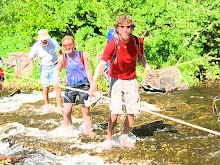If you live in Macedonia and maintain a blog, it's a good idea to have a generic ajvar-related post at the ready. Ajvar is a traditional local food made primarily from grilled, peeled peppers and an almost unimaginable quantity of sunflower oil and during early autumn nearly every household in Macedonia sets aside a weekend to make a winter's worth of the spreadable stuff. Last year we helped our landlords make ajvar, though by the time we got there the only task left for us was the constant stirring over the open fire.
This year, while Bube's away enjoying the American college life, we joined her family to partake in the ajvar tradition. Her father, Zoran, went to the weekly market near the center of town and bought 110 pounds of peppers and the grilling began in their yard. There was also Bube's mother, brother, aunt, and 78-year old grandmother, for whom making ajvar is about as automatic as breathing. Jillian and I were merely beer-drinking spectators during the grilling portion of the program; our real value was revealed during the peeling process. All 110 pounds of peppers, still warm, needed to be peeled before they could go through the grinder.
Peeling that many peppers takes awhile. In a rare few cases, the peel just slides off the meat of the pepper, but mostly it's a painstaking affair. Once the peel is off, the stem and seeds are disposed of and you move on the next. The family sits close together, throwing skins and seeds into a common bucket and talking while they work. It's very much an old world tradition, one of time and patience.
Apropos of this sentiment, Jillian asked Bube's brother, Milan, if he and his generation of classmates would continue the ajvar tradition when they were grown with families. Milan replied that he's never really given the subject any thought, though Zoran is convinced that young Macedonians won't be peeling peppers in the near future. Based on our experiences here, I have to agree. In the cities of Macedonia, modernity has firmly taken root, while in the villages the past is still present in many of the daily routines. It's in towns like Kriva Palanka where you can actively witness the old life being eclipsed by the new.
Having grown up in a thoroughly modern environment in which technology is king and traditions of the past were mostly abandoned by our baby boomer parents, we younger Americans have an inherent belief that progress is always for the better. When we can advance, we should. This mentality, after all, has borne us incredible achievements in work, medicine, leisure, and convenience. Along with such achievements come the markedly inane and questionably necessary peripheries; for every computer program that makes life easier, there are ten that seemingly exist only to kill brain cells. But that's to be expected. And while it's quaint to look at the villager riding his donkey through the streets of Palanka and remark, "Wow, he's from another time," it's a bit silly to think that modern automobiles are not clearly a major advance over beasts of burden.





2 comments:
Great to read your account in the HC alumni magazine. From 2005 to 2008, I made 5 trips to Macedonia to help train high school teachers in interactive, student-centered teaching strategies. Each trip lasted about 10 days, and we were not as engaged in the community as you two. However, I relish the taste of some good ajvar and great salads.
The high school teachers, about 200, were trained in Struga in a series of four weekend conferences. Most were very involved and were willing to use some of the strategies, such as discussion and debate, or reading to discover what was not known, in their classrooms. In 2008 I had the opportunity to visit five different high schools in the eastern part of the country and was very impressed with the dissemination and sharing of the teaching approaches in each school. The nearest I probably got to you was St Nicholai, which has a very open, energetic agricultural high school.
Enjoy the rest of your stay and I will look forward to reading your posts.
Jay Howard, HC'68
I have enjoyed reading about your peace corp adventure. Sad to see that your days are coming to a close. Where will I get my adventure fix? I am sure your time is limited, but please let us all know how the last few days are going. Can't wait to hear more.
Post a Comment